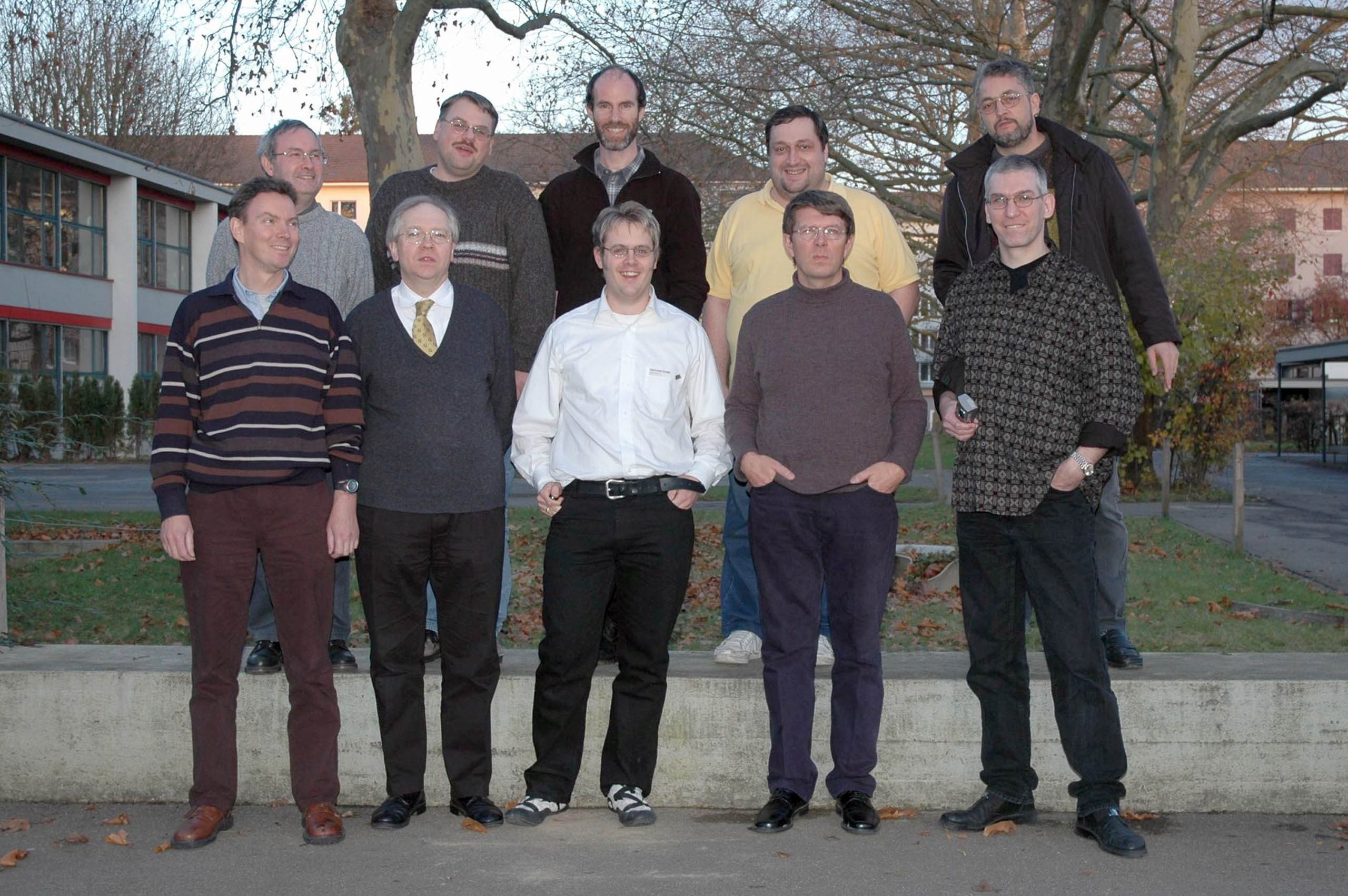Matthias Wehrli
|
 |
|
Review of the HP-Meeting on November 27th 2004 in Allschwil, Switzerland:
This is a summary.
The original report was written by Wlodek Mier-Jędrzejowicz and will be printed in the next DATAfile.
Allschwil is a suburb of the Swiss city of Basel, on the border between France, Switzerland and Germany. That makes it an appropriate place for a meeting of HP handhelds fans from these three countries, with a few from further afield.
|
On the morning of Saturday 27 November we gathered in Matthias’ apartment, in the afternoon we went to the school Matthias teaches at. There we had a large room so we could put lots of equipment on tables and talk about it. In the evening we went for a meal in a local Turkish restaurant, then back to Matthias´ place to continue talking till 2am.
I shall present the people, starting on the left upper side to the right lower side:
|
 |
Jean-Francois Garnier (France) showed hardware and software a Kristal S.A. informatique HP-IL interface, for a small Centronics plotter which was once popular in France, and his HP-41 emulation program with true support for HP-IL. He also showed versions of EMU41 for the HP Portable Plus and for the HP-LX palmtops.
Christoph Giesselink (Germany) showing his development of an Input/Output system for the HP-28 which did not have an input system other than the keyboard. Christoph is best known for maintaining the EMU48 emulator, created by Sébastien Carlier, that HP themselves use. He also showed his programs to emulate Pioneer calculators.
Christoph Klug (Germany), HPCC member, well known to Datafile readers for his enthusiastic articles about the HP-41 and HP-IL interfaces for it. He showed us three applications of his latest HP-IL interface, even sending text messages to the display of an HP-IL multimeter.
Patrice Torchet (France) is a second-generation HP handhelds programmer his father was an HP-71B programmer. He showed us his web page describing his very clever "Enculator" algorithm for factorising large numbers. This can be used on HP handhelds as his web site shows.
Michael Faulhaber (Germany), has programmed an HP-41 emulator in Fortran for mainframe computers, but has found that this will not work on IBM PCs and clones because the bit order is reversed on those compared to the mainframes. He talked about a program that emulates the old mainframes on a PC, and on which his HP-41 emulator might work. He is also an expert on the HP200LX.
Meindert Kuipers (Netherlands), showed us prototype boards for his new HP-41 MLDL-2000. This has been much discussed in online discussion areas and on the HP museum web site, and it was very nice to see real hardware. The three boards will go into an HP-41 card reader case (you have to provide your own), will provide memory space in which several HP-41 plug-in ROMs can stored, and in which new machine code can be written. The device will also provide a USB connection for an HP-41!
Wlodek Mier-Jędrzejowicz (England), HPCC member, special guest. I advertised HPCC, described HPCC meetings and mini-conferences, and also the US conferences, inviting those present to come. I introduced the HP schematics CD-ROM described in this issue, and also sold and signed a few books.
Matthias Wehrli (Switzerland), HPCC member, host of the meeting, is an avid collector of HP handhelds and desktops, specialising in accessories. He already shown us some interesting items from his collection in the morning, especially his comprehensive collection of HP-41 plug-in modules, and he acted as master of ceremonies.
Raymond del Tondo (Germany), who joined HPCC at the meeting, has been developing software for the HP48 family of calculators for years, including gems such as the Assembler ROM for the HP48SX, sold by W&W. He demonstrated W&W’s HP-IL interface for the HP48, made mainly for HP-41 users who wanted to keep using HP-IL with their HP48s.
Christophe Humbert (France) was looking for a way to transfer his customer data records from an HP Portable Plus to a PC spreadsheet and was very interested in the potential use of HP Palmtops as an intermediate step in this process.
This was a fascinating meeting, showing how HP handhelds fans support and use old HP hardware, but also software such as EMU48 that is used in the development of the latest HP models. I am delighted I went and I thank everyone I met there.
|
|
| To become one of the members of HPCC, use the link on the right side and fill in the membership application form. You will then also get 6 issues of DATAfile a year. |
 |
|